I am working on some code that builds simple palette based PNG files without libpng. The output file, at this stage only has IHDR, PLTE, IDAT(x3) and IEND chunks. The only thing which is possibly a bit different in that the pixel index values in the IDAT chunk are not compressed, that is the various zlib / block header bytes are as follows.
- CMF = 0x78.
- FLG = 0x9C (have also a few other values here but always with bit 5 clear).
- Block header byte = 0x01 (BFINAL = 1, BTYPE = 00).
From what I can see the code builds the file correctly, however some image viewers refuse to display the image completely, if at all.
- MS Paint is happy.
- GIMP is happy.
- LibreOffice Draw is happy.
- Ristretto >> Fatal error reading PNG image file: Not enough compressed data.
- ImageMagick >> identify: Not enough image data `20160317_PNG_064.png' @ error/png.c/MagickPNGErrorHandler/1645.
- Eye of Gnome >> not enough image data.
I have put the file through a few different tools, again with mixed results.
- optipng >> not enough image data.
- pngchunks does not report any errors.
- pngcheck does not report any errors.
Here is the hex view of the file 20160317_PNG_064.png
The picture it does generate is this small 8x8 pixel image.
So I am at a bit of a dead end as to what to try next. Any and all assistance is appreciated.
EDIT_000 Having narrowed down the issue to the Adler32 calculation here is, as requested by @Mark Adler, the code that I am using to calculate the Adler32 value with test data in the main function. Btw, it is not fancy and I code very verbose.
#include <stdio.h>
#define DEBUG
static const unsigned long GC_ADLER32_BASE = 0xFFF1; // Largest prime smaller than 65536 is 65521.
unsigned long Adler32_Update
(
unsigned long Adler32,
unsigned char *Buffer,
unsigned int BufferLength
)
{
unsigned long ulW0;
unsigned long ulW1;
unsigned int uiW0;
#ifdef DEBUG
printf("\n");
printf(" Incoming Adler32 value.................0x%.8X\n", Adler32);
#endif
ulW0 = Adler32 & 0xFFFF;
ulW1 = (Adler32 >> 0x0010) & 0xFFFF;
#ifdef DEBUG
printf(" Inital sum values are..................0x%.8X, 0x%.8X\n", ulW0, ulW1);
#endif
for (uiW0 = 0x0000; uiW0 < BufferLength; uiW0 = uiW0 + 0x0001)
{
ulW0 = (ulW0 + Buffer[uiW0]) % GC_ADLER32_BASE;
ulW1 = (ulW1 + ulW0) % GC_ADLER32_BASE;
}
#ifdef DEBUG
printf(" Final sum values are...................0x%.8X, 0x%.8X\n", ulW0, ulW1);
#endif
Adler32 = (ulW1 << 0x0010) | ulW0;
#ifdef DEBUG
printf(" Outgoing Adler32 value.................0x%.8X\n", Adler32);
#endif
return (Adler32);
}
unsigned long Adler32_Get
(
unsigned char *Buffer,
unsigned int BufferLength
)
{
unsigned long Adler32;
Adler32 = 0x00000001L;
Adler32 = Adler32_Update(Adler32, Buffer, BufferLength);
return (Adler32);
}
int main
(
unsigned int argc,
unsigned char *arg[]
)
{
unsigned long Adler32;
unsigned char data[272] =
{
0x00, 0x02, 0x02, 0x02, 0x02, 0x02, 0x02, 0x02, 0x02, 0x01, 0x01, 0x01, 0x01, 0x01, 0x01, 0x01,
0x01, 0x00, 0x02, 0x02, 0x02, 0x02, 0x02, 0x02, 0x02, 0x02, 0x01, 0x01, 0x01, 0x01, 0x01, 0x01,
0x01, 0x01, 0x00, 0x02, 0x02, 0x02, 0x02, 0x02, 0x02, 0x02, 0x02, 0x01, 0x01, 0x01, 0x01, 0x01,
0x01, 0x01, 0x01, 0x00, 0x02, 0x02, 0x02, 0x02, 0x02, 0x02, 0x02, 0x02, 0x01, 0x01, 0x01, 0x01,
0x01, 0x01, 0x01, 0x01, 0x00, 0x02, 0x02, 0x02, 0x02, 0x01, 0x01, 0x01, 0x01, 0x00, 0x00, 0x00,
0x00, 0x00, 0x00, 0x00, 0x00, 0x00, 0x02, 0x02, 0x02, 0x02, 0x01, 0x01, 0x01, 0x01, 0x00, 0x00,
0x00, 0x00, 0x00, 0x00, 0x00, 0x00, 0x00, 0x02, 0x02, 0x02, 0x02, 0x01, 0x01, 0x01, 0x01, 0x00,
0x00, 0x00, 0x00, 0x00, 0x00, 0x00, 0x00, 0x00, 0x02, 0x02, 0x02, 0x02, 0x01, 0x01, 0x01, 0x01,
0x00, 0x00, 0x00, 0x00, 0x00, 0x00, 0x00, 0x00, 0x00, 0x01, 0x01, 0x01, 0x01, 0x02, 0x02, 0x02,
0x02, 0x02, 0x02, 0x02, 0x02, 0x02, 0x02, 0x02, 0x02, 0x00, 0x01, 0x01, 0x01, 0x01, 0x02, 0x02,
0x02, 0x02, 0x02, 0x02, 0x02, 0x02, 0x02, 0x02, 0x02, 0x02, 0x00, 0x01, 0x01, 0x01, 0x01, 0x02,
0x02, 0x02, 0x02, 0x02, 0x02, 0x02, 0x02, 0x02, 0x02, 0x02, 0x02, 0x00, 0x01, 0x01, 0x01, 0x01,
0x02, 0x02, 0x02, 0x02, 0x02, 0x02, 0x02, 0x02, 0x02, 0x02, 0x02, 0x02, 0x00, 0x01, 0x01, 0x01,
0x01, 0x00, 0x00, 0x00, 0x00, 0x01, 0x01, 0x01, 0x01, 0x02, 0x02, 0x02, 0x02, 0x00, 0x01, 0x01,
0x01, 0x01, 0x00, 0x00, 0x00, 0x00, 0x01, 0x01, 0x01, 0x01, 0x02, 0x02, 0x02, 0x02, 0x00, 0x01,
0x01, 0x01, 0x01, 0x00, 0x00, 0x00, 0x00, 0x01, 0x01, 0x01, 0x01, 0x02, 0x02, 0x02, 0x02, 0x00,
0x01, 0x01, 0x01, 0x01, 0x00, 0x00, 0x00, 0x00, 0x01, 0x01, 0x01, 0x01, 0x02, 0x02, 0x02, 0x02
};
Adler32 = Adler32_Get(data, sizeof(data));
printf("\n");
printf("The Adler32 value is ..........................0x%.8X\n", Adler32);
return(0x00);
}
